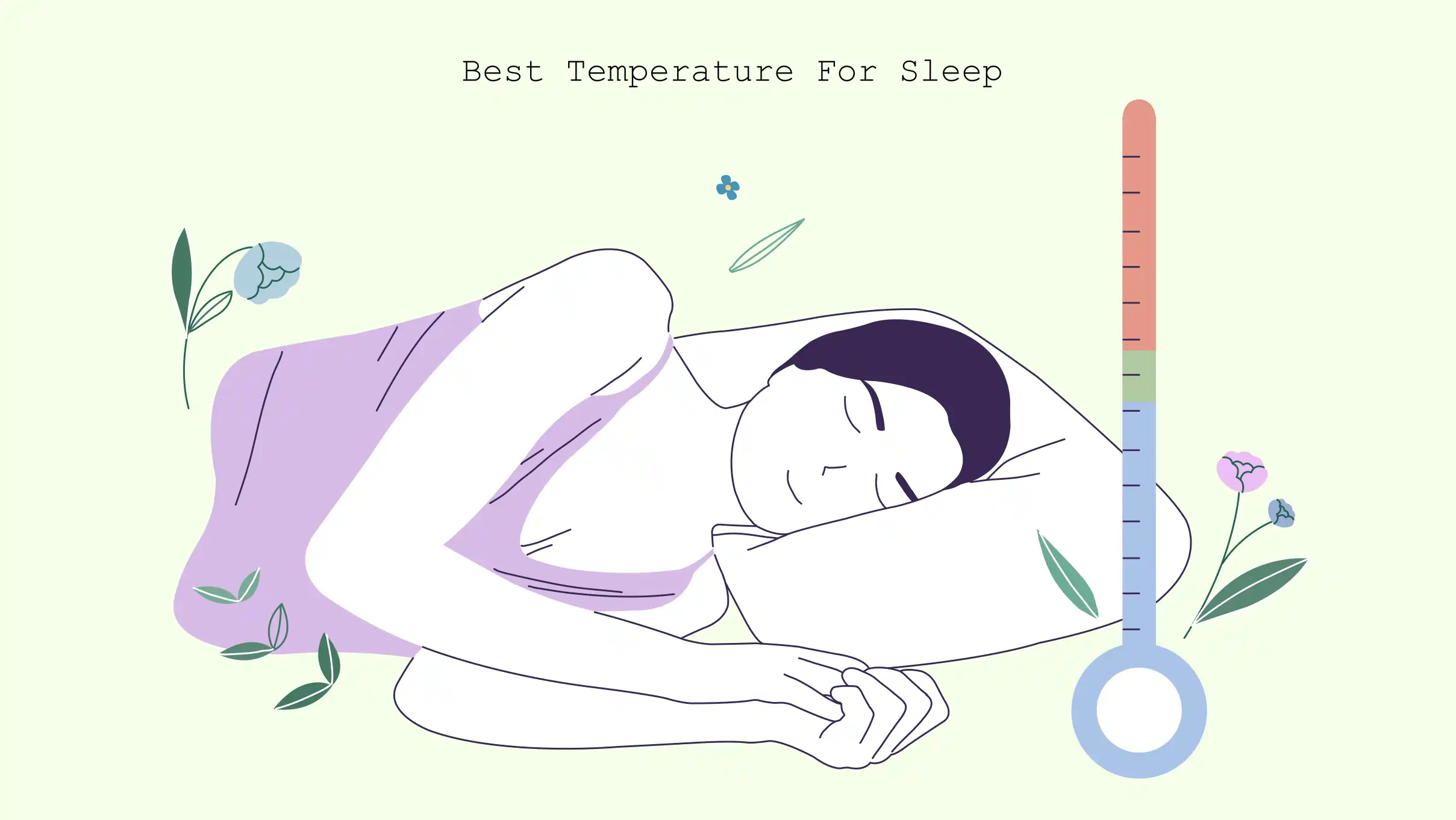Best Temperature for Sleeping
Written by


You are sleeping a good night’s sleep as soon as you hit the sack. A few minutes later, the sweat starts dropping out from your forehead. You wake up, slow down the temperature, and instantly dig yourself into the mattress. A few moments later, you hear the rumbling sound of your partner. They wake up and raise the temperature, making you sweat again.
This might not be the ideal situation at your house, but it does show the effect of room temperature on sleep. Quality sleep is essential for health, but most important is the ideal room temperature that facilitates sleep quality.
Now, what is the best temperature for sleeping? Let’s learn about it below.
Best Temperature For Sleep
A cold room temperature helps you sleep, stimulating overall body health. Though the ideal room temperature for sleep is 65 degrees Fahrenheit (18.3 degrees C), doctors suggest setting the thermostat between 60 to 67 degrees F as it is the optimal room temperature for sleeping.
The ideal temperature for sleeping in summer is 71.6 degrees F, whereas the perfect room temperature during winter is 73.4 degrees F to 75.2 degrees F.
The internal body clock, known as circadian rhythm, fluctuates by 2 to 3 degrees in a 24-hour cycle. It varies from person to person. Our core body temperature drops at night. Thus, keeping the thermostats low at night will aid better sleep and help regulate temperature.
What Is The Ideal Sleep Temperature For Babies
The baby is most comfortable and safe in the womb of a mother. Therefore, providing them with the same healthy environment is vital after birth. The ideal room temperature for infants is 67 degrees Fahrenheit. The 67 degrees is just one or two degrees more than the standard room temperature. It is the best sleeping temperature for babies. It is essential to be careful of the temperature as the baby’s skin is too sensitive. The ambient temperature impacts the newborn. The too warm temperature may cause sudden death syndrome in infants. Research shows that babies adapt to an external environment approximately 11 weeks after birth. Within 4 hours of bedtime, their core body temperature reaches 97.5 degrees F, similar to adults.
You can monitor your baby’s body temperature by touching the stomach or the back of the neck. The warm or cool touch will help you identify the ideal room temperature for your child. Moreover, if the chest or hair of your infant is sweaty, then the room temperature is too hot for your child. You might wonder how to make the room cooler to comfort your child. Reducing the temperature and removing extra layers of bedding will make your child comfortable. In winters, ensure you are not covering your child entirely as this may cause them suffocation. Try to use a fan instead of an air-conditioner. The air flows everywhere without cooling like an air conditioner, ensuring safe room temperature.
How Does The Temperature Affect Your Sleep
Our sleep cycle is regulated by circadian rhythm and the internal body clock based on light and darkness. The body temperature tends to fluctuate during the day and at night. The human body experiences different sleep stages at night. Initially, the body core temperature drops during non-rapid eye movement and further drops when we are in the deep sleep cycle. It is also known as a slow wave sleep state. During this phase, the heart rate and blood pressure decrease too. The hormone melatonin is released, which signals the brain to sleep.
Further, the body temperature while sleeping rises in the rapid eye movement stage, where heart rate and blood pressure rise too. The process continues till early morning and gradually increases as the day begins. Finally, the body tends to cool itself and sends the heat away from the core, known as vasodilation. In this process, the blood flows to the extremities causing the hands and feet to warm.
Suppose you want to know how to regulate the body temperature quickly; having a warm bath 2 hours before sleep will help. A warm bath increases blood circulation and regulates the body temperature for sleep. In addition, it would be beneficial to know that too hot or too cold room temperature affects the body’s thermoregulation process and is known as the ambient environment effect.
What Happens If The Temperature Is Too Hot
Being sweaty and dehydrated at night proves there is a lack of fresh air in the room. It makes your sleep difficult, making you restless. The body’s thermoregulation process is hindered due to too hot a temperature, causing fatigue. The tired person also fails to sleep fast due to the hot temperature. You won’t get the much-needed deep sleep at a higher core body temperature. If there is a significant difference between the core and extremities temperature, the body fails to drive away heat from the core temperature. The result is sleep deficiency, where you wake up before reaching the deep sleep stage.
The body stops the thermoregulation process when you are in the REM (Rapid Eye Movement) stage. This means the sweating or shivering stops as your body gets sensitive to the ambient temperature changes. For example, an excessive hot temperature wakes you from a deep sleep, causing a decrease in REM. The decline in REM impacts the body’s recovery process and immunity negatively.
What Happens If the Temperature is Too Cold
The hot temperature has a significant effect on the sleep cycle. On the other hand, the cold temperature doesn’t affect sleep that much. The reason being you can easily warm up yourself rather than cool down. However, when the temperature is too cold, the body generates heat. This body warming mechanism affects the body’s shivers and sleep. Therefore, you wake up to add an extra layer to the body to protect yourself from cold.
Nonetheless, the sleep cycle gets hampered, impacting overall health. If you tend to sleep cold, you might want to know how to keep a room warmer when it’s too cold. The ideal way is to adjust the thermostat and lower the air-conditioner. Moreover, using woollen clothes will help you to beat the cold.
Important Tips To Regulate Room Temperature
Below are some tips to regulate your room temperature that will help you stay asleep at a temperature that suits your body.
Set The Ideal Room Temperature
The ideal temperature is 66 to 70 degrees F. If you feel too hot or cold, try to adjust the thermostat to the degree that suits your body. Invest in a programmable thermostat to regulate your room temperature. It has many options, from setting up a specific time to warm the house or cooling the room before sleeping.
Natural Ventilation
Are you looking for the best way to cool a bedroom? Then look for natural ventilation when it comes to body health. Fresh air is essential for the lungs and heart. So the hot air from the room will go away, and the cool air will fill the room.
Open all the windows and curtains to allow the breeze to flow around the room. Keep the windows covered if it’s cold outside; however, ensure natural air and light enter the room. Sunlight is the best natural source to regulate your room temperature. Also, if the room is always closed, you will get a musty smell making you feel drowsy.
Use Fan Instead Of Air Conditioner
If you want chilled-free air, use a fan instead of an air-conditioner. The atmosphere is cooled with an air-conditioner, whereas a fan helps flow the air all around without making it cool, which is considered a safe room temperature.
Conclusion
Now that you know what temperature you should sleep at, there are other things you need to consider. If you feel too hot, wear cotton clothing while sleeping. Use mattresses that provide a cooling effect as you sleep. If feeling cold, use warm clothes and add layers of blankets for that extra warmth. The use of perfect clothing and bedding supports thermoregulation. Thus, it is crucial to wrap yourself up with appropriate layers of clothes and bedding per the climate and season.
FAQS
Does your body temperature drop when you sleep?
As nighttime draws near, body temperature begins to decrease, allowing for a restful night’s sleep. Usually, it goes down by 1 or 2 degrees as compared to the daytime.
Is it better to sleep in cold or warm?
To have a good night’s sleep, your bedroom should be cool but not cold. You’re more likely to toss and turn when it’s hot, which makes sleeping difficult. 18.3 °C is ideal for sleeping.
What is an unhealthy room temperature?
In any case, the temperature inside your home shouldn’t drop below 68 degrees Fahrenheit because doing so raises the danger of respiratory illnesses and, in extreme cases, hypothermia.
How cold is too cold sleeping temperature?
Any temperature, from below 65 to above 75, can hinder sleep. 68 to 72 degrees is the ideal temperature for restful sleep.
people like this article
Written by








